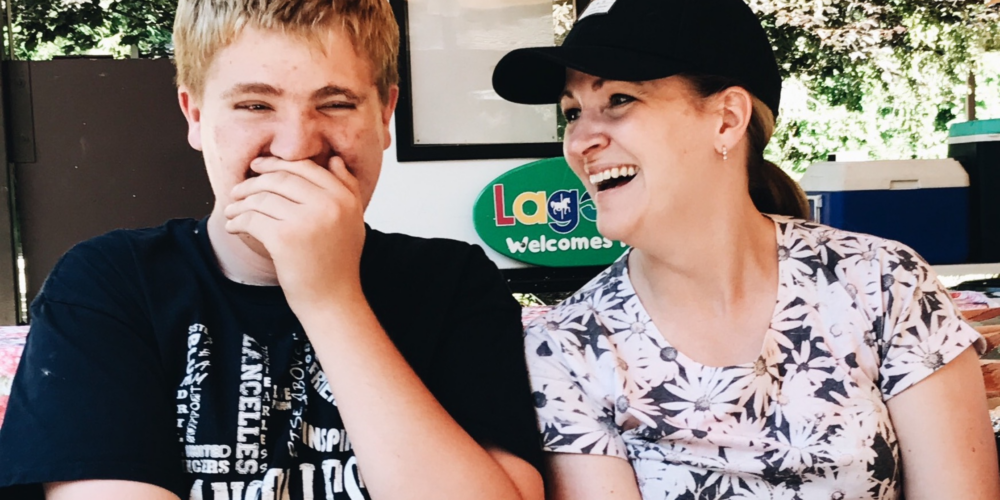I’ve been thinking about how important it is for us dads…

Radical Inclusion_ A Parent’s Perspective on Embracing Individuals with Intellectual Disabilities
As a parent of a child with intellectual disabilities, I have come to understand the true meaning
of inclusion. Inclusion is not just a buzzword or a policy—it is a fundamental right that ensures
individuals with intellectual disabilities have access to the same opportunities, relationships, and
experiences as everyone else. Radical inclusion, however, goes beyond the basics. It means
fostering a world where individuals with intellectual disabilities are not just present but truly
valued, respected, understood, and embraced in all aspects of life.
My husband & I learned about my son’s disability in utero. My first worry while holding my tiny
baby was, “How will we get through middle school?” These worries about how society would
perceive and accept him became a reality when neighborhood “friends” didn’t show up for his
birthday party & family members diminished my struggle as I would share the complex
experiences in our home.
I quickly realized that true inclusion does not happen automatically; it must be intentionally
cultivated, which is why advocating for inclusion is so important to me. Inclusion means
ensuring that individuals with intellectual disabilities are in classrooms, workplaces, and
community spaces where they can learn, contribute, and build relationships. However, radical
inclusion means reshaping these environments so that they actively celebrate differences and
recognize the strengths that come with intellectual disabilities.
In our education system, inclusion is often seen as placing individuals with intellectual
disabilities in mainstream classrooms. While this is an important step, it is not enough. Radical
inclusion requires adapting teaching methods, encouraging peer friendships, and fostering a
culture where individuals with intellectual disabilities are considered equal learners. This means
not only physical inclusion but also social and academic inclusion, where their unique abilities
are honored.
Similarly, in the workforce, inclusion for individuals with intellectual disabilities should go beyond
token representation. Many businesses today are beginning to see the value of hiring
individuals with intellectual disabilities, but radical inclusion means offering meaningful roles that
match their skills and aspirations. It means providing mentorship, fostering an inclusive culture,
and ensuring individuals with intellectual disabilities have the tools and support they need to
thrive professionally.
Community inclusion is another critical aspect. Many parents of children with intellectual
disabilities, including myself, have experienced the heartbreak of exclusion from community
events, extracurricular activities, and even simple gatherings. True inclusion ensures that
individuals with intellectual disabilities are invited, welcomed, and accommodated in all spaces.
Radical inclusion, however, takes it a step further by creating environments where their
participation is not just accepted but encouraged and celebrated.
One of the most significant barriers to inclusion is society’s perception of intellectual disabilities.
Too often, individuals with intellectual disabilities are defined by their challenges rather than their
strengths. Inclusion requires shifting the narrative to highlight their talents, contributions, and
potential. As a parent, I advocate for radical inclusion by educating others, challenging
stereotypes, and pushing for systemic changes that make inclusion a reality at every level.
Inclusion is not just the responsibility of parents or caregivers—it is a societal commitment.
Schools, employers, policymakers, and community members all play a role in fostering an
inclusive world for individuals with intellectual disabilities. Radical inclusion demands that we go
beyond surface-level efforts and embed inclusive practices into our daily lives. This means
actively listening to individuals with intellectual disabilities, valuing their perspectives, and
ensuring they have leadership roles in shaping policies that impact them.
As a parent, I dream of a world where inclusion is no longer a fight but a given. Where
individuals with intellectual disabilities are not merely included but embraced, respected, and
valued. Radical inclusion is about breaking down barriers, dismantling ableist mindsets, and
creating spaces where all individuals, regardless of their abilities, can thrive. It starts with each
of us making the conscious choice to advocate, educate, and practice true inclusion in every
aspect of life.
Inclusion is not an act of kindness—it is a fundamental right. For individuals with intellectual
disabilities, radical inclusion is the key to unlocking a world where they are seen, heard, and
celebrated for who they truly are.
